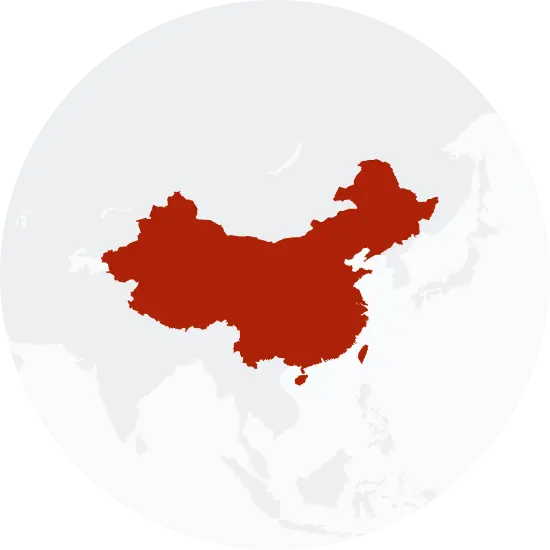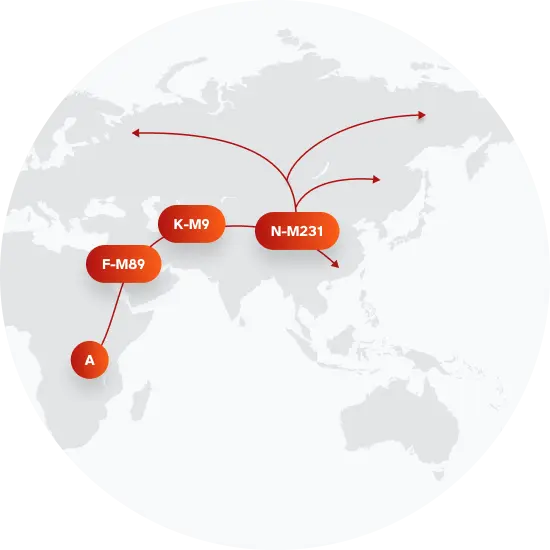Explore the Family Name Xia
How common is the last name Xia in the United States?
Based on the Decennial U.S. Census data, the surname Xia has seen significant growth in popularity between 2000 and 2010. In 2000, Xia was the 14,745th most popular surname, but by 2010 it had climbed to the 8,867th spot, a jump of almost 40%. During this same period, the number of individuals with the surname Xia nearly doubled from 1,847 to 3,693, representing an increase of approximately 100%. This rise is mirrored in the proportion per 100k people, which rose from 0.68 in 2000 to 1.25 in 2010, an increase of over 83%.
| 2000 | 2010 | Change | |
|---|---|---|---|
| Rank | #14,745 | #8,867 | 39.86% |
| Count | 1,847 | 3,693 | 99.95% |
| Proportion per 100k | 0.68 | 1.25 | 83.82% |
Race and Ethnicity of people with the last name Xia
In terms of ethnic identity, the Decennial U.S. Census data reveals that the overwhelming majority of individuals with the surname Xia identified as Asian/Pacific Islander in both 2000 and 2010, although there was a slight decrease of 0.64% over the decade. The proportion of those identifying as White increased by 38.04%, albeit from a small base. Interestingly, the proportion of individuals identifying as Hispanic more than doubled from 0.27% to 0.57%, despite starting from a very low base. The proportions of those identifying with two or more races remained constant at 0.65%, while there were no individuals who identified as Black, American Indian, or Alaskan Native in either year.
| 2000 | 2010 | Change | |
|---|---|---|---|
| Asian/Pacific Islander | 98% | 97.37% | -0.64% |
| White | 0.92% | 1.27% | 38.04% |
| Two or More Races | 0.65% | 0.65% | 0% |
| Hispanic | 0.27% | 0.57% | 111.11% |
| Black | 0% | 0% | 0% |
| American Indian and Alaskan Native | 0% | 0% | 0% |
Xia ancestry composition
23andMe computes an ancestry breakdown for each customer. People may have ancestry from just one population or they may have ancestry from several populations. The most commonly-observed ancestry found in people with the surname Xia is Chinese, which comprises 93.8% of all ancestry found in people with the surname. The next two most common ancestries are Korean (2.7%) and Manchurian & Mongolian (1.8%). Additional ancestries include Chinese Dai, Eastern European, Vietnamese, Iranian, Caucasian & Mesopotamian, and Central Asian.
Ready to learn more about your ancestry? Get the most comprehensive ancestry breakdown on the market by taking our DNA test. Shop 23andMe
| ANCESTRY BREAKDOWN | COMPOSITION |
|---|---|
| Chinese | 93.8% |
| Korean | 2.7% |
| Manchurian & Mongolian | 1.8% |
| Other | 1.7% |

Possible origins of the surname Xia
Your DNA provides clues about where your recent ancestors may have lived. Having many distant relatives in the same location suggests that you may all share common ancestry there. Locations with many distant relatives can also be places where people have migrated recently, such as large cities. If a large number of individuals who share your surname have distant relatives in a specific area, it could indicate a connection between your surname and that location, stemming from either recent ancestral ties or migration.
Based on 23andMe data, people with last name Xia have recent ancestry locations in China and Taiwan.
| RECENT ANCESTRY Location | Percentage |
|---|---|
| Guangdong, China | 17.40% |
| Jiangsu, China | 17.40% |
| Zhejiang, China | 17.40% |
| Hebei, China | 16.80% |
| Hunan, China | 16.80% |
What Xia haplogroups can tell you
Haplogroups are genetic population groups that share a common ancestor on either your paternal or maternal line. These paternal and maternal haplogroups shed light on your genetic ancestry and help tell the story of your family.
The top paternal haplogroup of people with the surname Xia is N-L665, which is predominantly found among people with East Asian & Indigenous American ancestry. Haplogroup N-L665 is descended from haplogroup N-M231. Other common haplogroups include O-F114 and O-F8, which are predominantly found among people with East Asian & Indigenous American and East Asian & Indigenous American ancestry. Other surnames with similar common haplogroups are: Fu, Chiang, He, Song, Shi, Jiang, Wang, Chang, Wu, Ko.
The most common maternal haplogroups of people with Xia surname are: F1, D4, M7b. These most commonly trace back to individuals of East Asian & Indigenous American and European ancestry.
 Paternal Haplogroup Origins N-M231
Paternal Haplogroup Origins N-M231
Your paternal lineage may be linked to the people of the lower Xiajiadian culture
Remains from three humans found at a site called Dadianzi in the Inner Mongolian Autonomous Region of China, belonged to haplogroup N-M231. The Dadianzi site was dated to 3,600 years old, and it also contained pottery, bronze artifacts, and burial rituals. The artifacts are from a period called the Lower Xiajiadian culture, which was a main branch of the bronze culture of northern China 4,500-3,500 years ago, primarily practiced in the West Liao-River valley. This wealthy civilization had highly developed agriculture, unique painted pottery, and other elaborate artifacts. The human remains found at Dadianzi indicate that haplogroup N-M231 made up a large proportion of the Lower Xiajiadian culture population, perhaps as far back as 12,000 years ago in northern China.
Your maternal lineage may be linked to the Han
Members of haplogroup D are found in both northern and southern Han Chinese populations at low to moderate frequencies. The Han people, who all share the same language and similar cultural practices, are the largest ethnic group in the world, with about 1.2 billion people. Historical evidence shows that Han people are descendants of the ancient Huaxia tribes that come from northern China, and Han language and culture only expanded into southern China in the last 2,000 years. The spread of Han people and culture from northern to southern China was likely driven by warfare and famine in the north.

What do people with the surname Xia have in common?
Spoiler alert: it's complicated. People with the same last name are usually no more genetically similar than a randomly sampled group of people from the same population. That said, people with the same surname are more likely to have similar ancestries than randomly sampled individuals. The reason is the tendency of people with similar cultural or geographical backgrounds to preferentially mate with one another. That's why people who share a surname may be more likely to share traits and tendencies in common than people within the general population. Check out the percentages below to see the prevalences of tastes, habits, and traits of people with your surname compared with prevalences among 23andMe users.
Preferences
Traits

Cheek Dimples
Small indentations that appear on the cheeks when a person smiles.
"Xia" Surname 40.9%
23andMe Users 37.6%
Wellness

Migraine
A severe headache characterized by intense pain, sensitivity to light and sound, and often accompanied by nausea and vomiting.
"Xia" Surname 5.0%
23andMe Users 16.4%
Are health conditions linked to the last name Xia?
The short answer is that, if there is an association between surname and health, it's usually more about your ancestry than your name. Individuals with a given surname are no more genetically similar than the general population but often have similar ancestries. The populations of people associated with those shared ancestries often have sets of genetic variations, also known as alleles, in common. Some of those alleles are associated with a greater likelihood of developing certain diseases.
Disease variant frequency by ancestry
Disease allele frequencies in populations associated with the surname Xia are shown below. Important Note: not everyone with a disease allele will develop these health condition




